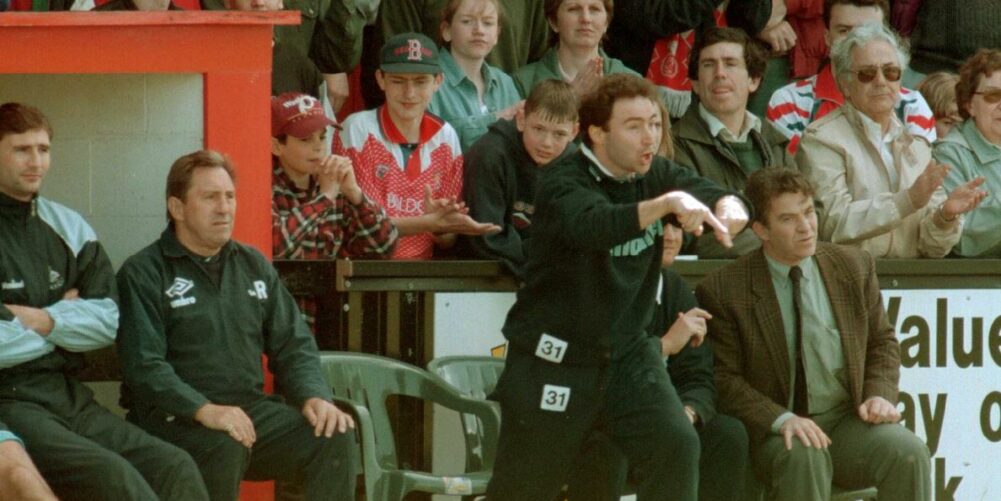By David Richardson,
TWO-TIME European Cup winner, a First Division title medal and 64 caps for Northern Ireland – but Martin O'Neill knew he would vanish from the game should he not be successful in Non-League management.
The Nottingham Forest midfielder excelled at club level under legendary boss Brian Clough, being part of his famous sides that conquered Europe in 1979 and 1980.
His CV, which also featured spells at Norwich City, Manchester City and Notts County, was undoubtedly impressive although landing a role as a manager proved difficult.
O'Neill's breakthrough came at the unlikely surroundings of Southern League side Grantham Town in 1987.
“I applied for other jobs in the Football League and I didn't even get an interview for most of them,” O'Neill, who has now managed Leicester, Celtic, Aston Villa, Sunderland, Ireland and Nottingham Forest, told The NLP. “There was a great deal of emphasis in the Football League for taking players with decent pedigree who could maybe do two roles and play.
My knee had completely buckled so it would be a straight managerial role.
“People talk about you go down into the lower leagues because you can learn from your mistakes and do a lot of those things that don't really go noticed that much. I'm not an adherent of that, I really don't believe it. I think you can make mistakes in Non-League or lower leagues and you can disappear forever.
“People would then say if you can't do it at Non-League level how can you do it at League level? The risks were greater going down there at that time. I had a chance to manage at Grantham. I enjoyed that immensely and it gave me a great experience.”
During his two seasons at London Road, Grantham narrowly missed out on promotion and then finished fifth before O'Neill had a short stint at Shepshed Charterhouse.
But it was his appointment in February 1990 at Conference side Wycombe Wanderers where the Northern Irishman really made his mark as the club moved from their famous sloping Loakes Park ground to Adams Park.
In his first full season, they finished fifth while Barry Fry's Barnet clinched promotion to the Football League.
However, Wycombe beat Kidderminster Harriers 2-1 in the 1991 FA Trophy final at Wembley in front of almost 35,000 to secure the first trophy of O'Neill's management career that now boasts promotions from the Third and First Division, two Football League Cups, three Scottish Premier League titles, three Scottish Cups, a Scottish League Cup and qualification to the Euro 2016 round of 16.
“Barry Fry, if he doesn't mind me saying, was probably the king of Non-League,” recalled O'Neill. “He had Barnet up and running.
“They were very, very strong. Barry knew a lot of players too, that was something I had to try and get used to. I inherited some very, very good players at Wycombe and I also brought a number of players in, they combined well.
“The Conference was very much a step up, some of these players had two jobs, would come for two nights per week and their enthusiasm, drive and determination and their love of football was so effusive, it was great to behold.
Success
“The FA Trophy was something the chairman at the time Mr Beaks was always wanting to win. It was treated with incredible seriousness.
“Winning it was naturally important for myself and the players because it gave you that confidence. Obviously for the start of the following season it was an amazing boost.”
The Wembley high spurred them on to challenge for the title in 1991-92 but they lost out to Colchester United on goal difference as both sides finished on 94 points, 21 ahead of Kettering Town in third.
“Colchester had been relegated but they had kept all their players and were a professional team in a semi-professional league,” said O'Neill.
“That was an amazing achievement for us that season to chase a full-time side. We had a midweek trip to Macclesfield towards the end of the season where players had to get time off work.
“I knew that at the start of the next season that would be the hardest thing to overcome but the players had a terrific mentality to it all. The message at the start was we can do it again.”
And they did, winning the title by 15 points and lifting the FA Trophy for the second time in three seasons with a 4-1 victory over Runcorn.
“That was a special group of players at Wycombe at the time,” he added. “Maybe I helped teach them how to win football matches, which was naturally very important. Of course we went on to win promotion through the play-offs the following season with the same players, who were now professional. After I'd gone they reached the FA Cup semi-finals.
“I was determined to make it work, I spent a lot of time travelling up and down the country watching matches, watching players.
“I knew that all the work I did there stood me in good stead later on. I used to watch Chelsea reserves every second Monday night playing at Kingstonian and I would see the likes of Muzzy Izzett playing, so when I was at Leicester City I knew he was good enough to play for Leicester and in the Premier League.
“I felt that my pedigree as a player would have entitled me at least to start off higher but would I change anything at Wycombe Wanderers after the experience I've had? Not a thing.”
















